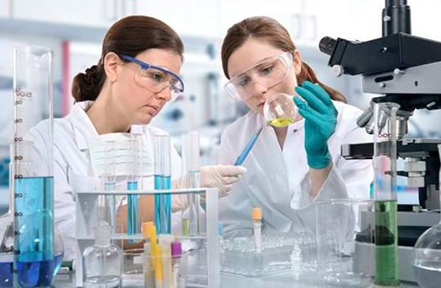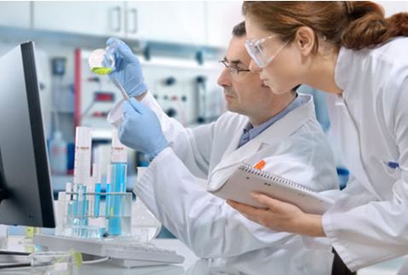We
all know that you need to choose a suitable major for yourself before entering
the university. If you don't know how to choose a suitable major, you can
choose one according to your own hobbies or areas of expertise. There are many
disciplines and majors in the university to choose from. And many engineering
majors require strong practical skills. If you have strong practical skills, studying
chemical engineering and technology will be a good choice for you. Because you
will do frequent chemical experiments, which is a test of your operation
ability.
Chemical
engineering and technology major studies the general principles and physical processes
of chemical and physical in the production process of other process industries such
as petroleum refining industry, metallurgical industry, food industry, printing
and dyeing industry, etc. It is an engineering discipline that applies these
laws to solve the problems of process and device development, design, operation
and optimization.
This
major focuses on large-scale changes in the chemical composition of materials
and their mechanical and physical properties. It is applied to the chemical
industry based on mathematics and a small amount of physical concepts to
provide the most cost-effective reaction process design method for factories
that produce various chemicals or materials. Experimental research, theoretical
analysis and scientific calculation have become the three main methods
indispensable in contemporary chemical research.

The training goal of
this major is to enable graduates to have broad theoretical basic knowledge and
be familiar with the professional principles, professional skills and research
methods of chemical production technology. Graduates should also be able to
engage in product research and development, device design, production process
control and production process control in the process industry.
The
basic requirements for graduates of this major are:
(1)
Have a strong sense of social responsibility and good scientific literacy.
(2)
Have strong self-study ability, expression and communication skills, and the
ability to deal with practical engineering problems.
(3)
To systematically master the basic theories and professional knowledge of
chemical engineering and technology, be able to combine the socio-economic
goals of chemical production and engage in research, development, design, production
and business management.
(4)
Full of truth-seeking spirit, innovative spirit, cooperative spirit and
adaptability, with certain international communication ability.
(5)
Master a foreign language proficiently and pass the National Foreign Language
Test Band IV.
(6)
Have basic skills in using computers.
Research directions:
1. Chemical separation
project:
This
direction mainly engaged in the research of new separation technology process
and equipment, traditional chemical separation technology improvement, separation
technology coupling, etc. At present, special research directions are formed in
the extraction and separation of effective ingredients from natural plants, the
extraction and separation of effective ingredients from traditional Chinese
medicine and membrane separation technology and equipment.
2. Green chemical
process:
This
direction mainly engaged in the research and development of green reaction
process, environmentally friendly new molecules and new materials, reaction and
separation integrated technology. The direction does research on the properties
of starting materials and products of green chemical processes. At present,
technical research and development have been carried out in the aspects of
photocatalytic degradation technology, clean reaction processing technology,
green separation technology, environmentally friendly tannery and clean
chemical innovation technology.
3. New chemical
materials:
The
research direction is a multidisciplinary field, mainly engaged in the research
and development of new energy chemical materials and new chemical separation
materials. At present, research has been carried out in the design,
preparation, characterization and application of porous inorganic organic. It
provides an effective way to quickly solve the bottleneck or disconnection
between basic research and industrialization in the field of new chemical
materials.
4. Catalytic technology
and application:
Catalytic
technology is of great significance in the national economy. Many challenges
faced by contemporary mankind, such as energy development, the comprehensive
utilization of natural resources, the development of new materials, and the
solution of major issues in environmental protection. They all rely on
catalytic processes to varying degrees. This direction mainly focuses on the
design and preparation of homogeneous and heterogeneous catalysts and enzyme
catalysts and their application research in organic synthesis and fine chemical
synthesis.
5. Fine Chemical
Chemistry and Technology:
Fine
chemicals refer to chemical products with specific functions, technology
intensive, extensive use of compound technology, small batches of multiple
varieties and high added value. Fine chemical chemistry and technology, as a
research direction of applied chemistry, is based on chemistry, chemical
industry, petroleum, light industry and material chemistry. This research
direction not only attaches importance to the research of modern synthetic new
theories and new technologies, but also attaches importance to their
applications, with distinctive light industry characteristics.
6. Environmental
pollutant control chemistry and technology:
This
direction is mainly engaged in the control chemistry research and process
technology development of chemical pollutants in water, focusing on the
chemical principles and process conditions of using photochemistry,
electrochemistry, sonochemistry and other chemical and physical methods to
decompose organic pollutants in water. It is a high pollution and micro
pollution industry.
Practical teaching:
1. Electrician
internship
Conduct
practical training on the use of common electrician tools, lighting, internal
and external wiring and cable installation, installation of switches, relays,
control panels, and handling of control loop failures.
2. Metalworking
practice
Make
students familiar with the basic knowledge of mechanical manufacturing
technology and understand the knowledge of mechanical processing equipment,
tools, and operational safety. Strengthen the ability to practice, analyze and
solve problems, accept the cultivation of ideological style, and lay the
necessary foundation for future work.
3. Organic Synthesis
Practice
Organic
synthesis practice is part of the practical training of professional basic
courses. The purpose is to train students to have a rational understanding and
understanding of typical operations and typical reactions in organic reactions.
Its task is to enable students to learn how to handle chemicals, cultivate
students' experimental skills and techniques, and use conventional instruments
proficiently.
4. Chemical engineering
practice
The
main content includes the synthesis and application of surfactants, the
synthesis of chemical intermediates, the synthesis of adhesives, the
formulation of coatings, the formulation of cosmetics, the synthesis of industrial
additives, etc. Students should master laboratory synthesis and compounding
technology and combine the industrial equipment of the practice base to
understand the development.
5. Production practice
Through
on-site visits, listening to first-line engineering and technical personnel,
and management personnel to explain, students can initially obtain the industry
characteristics, enterprise viewing, enterprise management status, product types,
production equipment types, raw material characteristics, process technical
characteristics, etc.
Employment prospects:
The
professional employment rate of chemical engineering and technology is
relatively high. Graduates are generally engaged in technology research and
development, production management, sales and other related jobs in chemical,
oil refining, metallurgy, light industry, medicine, environmental protection,
new energy and other industries. The positions include process engineer,
R&D engineer, chemical process engineer, chemical engineer, reserve cadre,
technician, lithium battery process engineer etc.





Comment Cancel reply